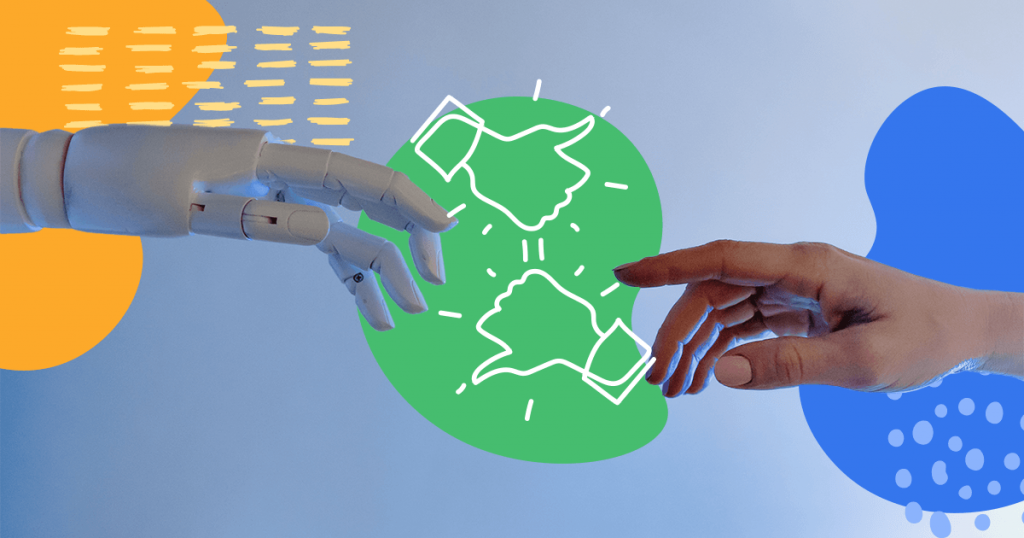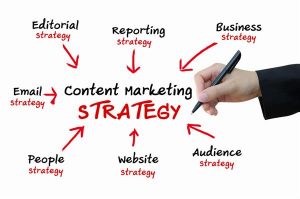Whether you’re excited, curious, or dreading the rise of artificial intelligence (AI), it’s starting to show up more and more in different areas, including marketing.
As an emerging technology, AI is already playing a pivotal role in fields like medicine, science, engineering, advertising, and data analysis.
Just look at how you are already benefiting from AI with the likes of Alexa, Siri, Cortana, and Google Assist. And that’s only the start.
Computers are expanding capabilities, learning from various stimuli, and responding in human-like ways like never before.
While not everyone can agree on the various advantages and disadvantages of AI, it is here to stay, so learning all you can about it will help you use it to your advantage now or in the near future.
This blog post will cover artificial intelligence’s pros and cons, but before that, let’s understand exactly how it works.
Download this post by entering your email below
How Does Artificial Intelligence Work?
No longer a futuristic concept, machines with AI capabilities now do things previously restricted to the workings of the human brain.
Essentially, artificial intelligence allows a computer to learn and think (almost) on its own. Obviously, while AI can be trained to process and analyze data, it does not possess the same cognitive abilities as the human brain.
But how exactly does it work?
It all starts with designing the AI to meet a specific goal. From there, it is trained on available data as it learns how to best achieve the given goal.
When it reaches a level of learning, the AI then takes on the data independently. Then, after analyzing all the data, AI makes predictions based on what it finds.
Going forward, it uses what it learns to improve its approach. In other words, it gets smarter and smarter.
This can be good or could go terribly wrong down the road. Yet, today, it offers a set of pros and cons you and your organization need to know now.
While AI continues to evolve and learn, bringing significant efficiencies to many processes, it’s essential to remember the unique value of human input. As Giu Caltabiano, VP of Marketing at Rock Content, explains: At Rock Content, we believe that AI can make our marketplace smarter and more efficient — while still relying on human creativity to produce the most captivating content.
Pros of Artificial Intelligence (AI)
The pros of AI applications may revolutionize sectors or industries going forward in profound ways, including the following:
1. Diminishes Human Error
Humans can make mistakes, but computers, if programmed properly, will make fewer mistakes in certain areas.
Since AI decisions come from compiled data with designed algorithms, errors are reduced, accuracy is increased, and precision is possible.
However, it is important to note that humans are responsible for designing and programming the algorithms.
While AI can reduce certain types of errors, it is not immune to its own limitations and can make mistakes or produce biased outcomes based on the data it is trained on.
2. Facilitates Faster Decision-Making
Finding ways to save time by making faster decisions is always valuable. AI can do this for you.
AI works alongside various technologies to aid machines in making those decisions faster than many human workers.
The more decisions AI makes, the more it has to pull from for future decision-making, improving the process.
3. Offers Continual 24/7 Availability
AI (almost) never rests or requires sleep, while the human body and mind need rest to continue to function at optimal levels.
I said “almost” because, while AI systems can operate continuously, they still require regular maintenance, updates, and occasional downtime for maintenance and optimization.
However, this almost continual availability can make a huge impact on increases in your company’s productivity.
4. Lessens Risk
A huge advantage of AI is it can take on risky tasks which, for humans, would be extremely hazardous.
This minimizes the risks involved in certain endeavors.
For example, AI robots can mine for coal, explore the deepest depths of the sea, defuse a bomb, and even enter a volcano.
5. Automates Repetition
Repetitive work and tasks remain part of many jobs these days, often not utilizing the highest potential of human workers.
AI can automate repetition in a variety of ways, such as for manufacturing tasks and responding to emails.
Essentially, by automating repetitive jobs, you can focus on becoming more productive, freeing you to focus more on creativity or other areas requiring uniquely human skills.
6. Provides Digital Assistants
Today, many organizations use digital assistants for customer interactions.
This one act alone can significantly reduce the need for excessive customer service staff.
For example, the rise in the use of chatbots already proves how useful they can be in directing customers to the information needed. Another is the rising voice bot to help with queries.
AI technology might get to a point where you may not even be able to determine if you are chatting with a chatbot in some circumstances.
7. Identifies Patterns
AI efficiently identifies patterns within your data and, in turn, can make quicker predictions.
These can help you in marketing decisions by allowing you to see the bigger picture faster.
Artificial intelligence already excels above human abilities when it comes to detecting patterns in words, numbers, or images.
Not only will all this positively affect your marketing analytics capabilities, but it will also serve you when devising your next digital marketing plan.
8. Identifies Better Human Workflows
Finding ways to work more efficiently and increase productivity and, in turn, revenue, includes developing better human workflows.
In other words, it provides a way for AI and humans to work together at maximum capacity and can positively transform how we work in the future.
9. Excels at Working with Large Sets of Data
The more data available, the more AI is needed to make sense of it all in less time.
Artificial intelligence is highly beneficial in making sense of the large sets of data available these days.
It can both acquire and extract data rapidly, but that’s not all. From there, AI takes the data further with interpretation and transformation.
Cons of Artificial Intelligence (AI)
AI is not immune from disadvantages and problematic concerns, including these eight:
1. Reduces Employment
While replacing repetitive jobs and other types of work with AI is beneficial to a company, it will undoubtedly also affect employment.
Traditional job roles will be phased away, leading to the unemployment of those who do them.
While this may be seen as a sign of progress, workers will be shut out of many job opportunities that once existed.
2. Lacks Creative Ability
One of the drawbacks of using AI, particularly when playing a role in your content marketing strategy, is its inability to be creative and innovative.
Current AI systems excel at pattern recognition and generating new content based on existing data, but they do not possess true creativity or the ability to think outside the box.
According to many, AI is expected to become more intelligent in the years ahead, far surpassing human capabilities. But this statement is speculative and not universally accepted by experts, though.
Human wisdom and creative thinking are still needed and highly valued throughout various industries worldwide.
3. Absence of Emotional Range
While AI-enhanced machines can work faster and continually, they cannot factor emotion into decisions.
AI remains highly rational and practical at all times. And because of this, it cannot develop bonds with humans or make that true human connection.
Emotions play a key role along the buyer’s journey, so you can see why this can be a problem when it comes to incorporating AI into your digital marketing strategy.
Some AI systems are being developed to recognize and respond to human emotions to a certain extent, though.
4. Ethical Dilemmas
A struggling point for using AI is its limitation to incorporate ethics and morality, which are important human features.
AI only has data and algorithms to form decisions and predictions.
In turn, bias may be inherent within the data in some way, conscious or unconscious, and might lead to discriminatory output since it can focus on logical conclusions only,
Ethical considerations in AI development and deployment are an active area of research and discussion, and efforts are being made to develop AI systems that can incorporate ethical principles.
5. Increases Potential for Human Laziness
Automating tasks and utilizing more and more digital assistants can lead to increased machine dependency and even human laziness.
Relying on AI can cause us to use our brains less to memorize, strategize, and solve issues on our own. The effects this may have on future generations may be vast if left unacknowledged.
Artificial intelligence can be highly beneficial for everyone going forward, as long as a certain amount of attention is directed at not letting it get out too far advanced as to become dangerous.
At the end of the day, while AI can automate certain tasks and assist in decision-making, it is up to individuals and organizations to determine how they utilize AI technology and whether it leads to increased laziness or productivity.
6. Privacy and Data Security Concerns
AI systems often rely on large amounts of data to function effectively. This raises concerns about privacy and data security.
With the vast collection and analysis of personal data, there is a risk of unauthorized access, data breaches, and potential misuse of sensitive information. Safeguarding data privacy becomes crucial when AI technologies are involved.
7. Lack of Transparency and Explainability
AI algorithms can be complex and difficult to understand, especially in deep learning and neural network models.
This lack of transparency and explainability can make it challenging to determine how AI systems arrive at certain decisions or predictions.
This “black box” nature of AI can raise issues related to accountability, fairness, and bias, as it becomes challenging to identify and address potential algorithmic biases or errors.
8. Dependency and Reliability
As AI becomes increasingly integrated into various systems and processes, there is a growing dependency on its capabilities.
This dependency can pose risks if AI systems experience failures or malfunctions. Reliability becomes a concern when critical tasks and decision-making processes rely heavily on AI.
Ensuring the robustness and reliability of AI systems plus counting on human work becomes essential to prevent potential disruptions and mitigate risks associated with dependency on AI technologies.
Wrap Up: Weighting Artificial Intelligence’s Pros and Cons
Good or bad, artificial intelligence is here to stay.
AI is already a big part of many sectors, including marketing, so knowing the pros and cons now can prepare you for the present and future.
It’s important to remember that AI can never completely replace the value of the human touch. In fact, when it comes to marketing, AI and humans make a fantastic team. That’s why at WriterAccess, we focus on the synergy between cutting-edge AI functionalities and the irreplaceable value of human creativity.
Embracing AI with WriterAccess
Our AI-powered platform does more than just connect you with top-notch writers; it uses advanced algorithms to ensure that every piece of content is optimized for both your audience and search engines. This includes features like AI-driven analytics for audience insights, automated content grading for quality assurance, and dynamic content recommendations to keep your strategy sharp and effective.
Introducing WriterAccess Humanizer
However, to truly humanize AI content, we’ve developed the WriterAccess Humanizer. This innovative service enhances AI-generated content by weaving in human insights and emotional intelligence. The Humanizer ensures that your content is not only technically proficient but also deeply engaging and resonant with your audience.
So, why wait? Try our 14-day trial of WriterAccess. With our blend of AI efficiency and human creativity, you’ll see your content soar to new heights. Give it a go and witness the transformative impact on your marketing efforts!


![[ROCK NA] [WA] Humanizer - best of both worlds](https://rockcontent.com/wp-content/uploads/2024/04/EN-Banners-AI-Humanizer_Social-Media-1200x630-1.png)






